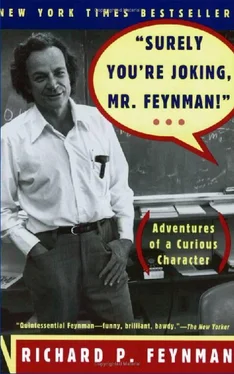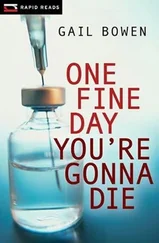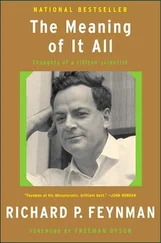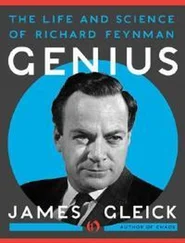I wrote back again and said I didn’t really know anything, and doubted I could help them.
Finally I got a letter from the Secretary of the Army, which proposed a compromise: I would come to the first meeting, where I could listen and see whether I could make a contribution or not. Then I could decide whether I should continue.
I said I would, of course. What else could I do?
I went down to Washington and the first thing that I went to was a cocktail party to meet everybody. There were generals and other important characters from the army, and everybody talked. It was pleasant enough.
One guy in a uniform came to me and told me that the army was glad that physicists were advising the military because it had a lot of problems. One of the problems was that tanks use up their fuel very quickly and thus can’t go very far. So the question was how to refuel them as they’re going along. Now this guy had the idea that, since the physicists can get energy out of uranium, could I work out a way in which we could use silicon dioxide—sand, dirt—as a fuel? If that were possible, then all this tank would have to do would be to have a little scoop underneath, and as it goes along, it would pick up the dirt and use it for fuel! He thought that was a great idea, and that all I had to do was to work out the details. That was the kind of problem I thought we would be talking about in the meeting the next day.
I went to the meeting and noticed that some guy who had introduced me to all the people at the cocktail party was sitting next to me. He was apparently some flunky assigned to be at my side at all times. On my other side was some super general I had heard of before.
At the first session of the meeting they talked about some technical matters, and I made a few comments. But later on, near the end of the meeting, they began to discuss some problem of logistics, about which I knew nothing. It had to do with figuring out how much stuff you should have at different places at different times. And although I tried to keep my trap shut, when you get into a situation like that, where you’re sitting around a table with all these “important people” discussing these “important problems,” you can’t keep your mouth shut, even if you know nothing whatsoever! So I made some comments in that discussion, too.
During the next coffee break the guy who had been assigned to shepherd me around said, “I was very impressed by the things you said during the discussion. They certainly were an important contribution.”
I stopped and thought about my “contribution” to the logistics problem, and realized that a man like the guy who orders the stuff for Christmas at Macy’s would be better able to figure out how to handle problems like that than I. So I concluded: a) if I had made an important contribution, it was sheer luck; b) anybody else could have done as well, but most people could have done better, and c) this flattery should wake me up to the fact that I am not capable of contributing much.
Right after that they decided, in the meeting, that they could do better discussing the organization of scientific research (such as, should scientific development be under the Corps of Engineers or the Quartermaster Division?) than specific technical matters. I knew that if there was to be any hope of my making a real contribution, it would be only on some specific technical matter, and surely not on how to organize research in the army.
Until then I didn’t let on any of my feelings about the situation to the chairman of the meeting—the big shot who had invited me in the first place. As we were packing our bags to leave, he said to me, all smiles, “You’ll be joining us, then, for the next meeting.”
“No, I won’t.” I could see his face change suddenly. He was very surprised that I would say no, after making those “contributions.”
In the early sixties, a lot of my friends were still giving advice to the government. Meanwhile, I was having no feeling of social responsibility and resisting, as much as possible, offers to go to Washington, which took a certain amount of courage in those times.
I was giving a series of freshman physics lectures at that time, and after one of them, Tom Harvey, who assisted me in putting on the demonstrations, said, “You oughta see what’s happening to mathematics in schoolbooks! My daughter comes home with a lot of crazy stuff!”
I didn’t pay much attention to what he said.
But the next day I got a telephone call from a pretty famous lawyer here in Pasadena, Mr. Norris, who was at that time on the State Board of Education. He asked me if I would serve on the State Curriculum Commission, which had to choose the new schoolbooks for the state of California. You see, the state had a law that all of the schoolbooks used by all of the kids in all of the public schools have to be chosen by the State Board of Education, so they have a committee to look over the books and to give them advice on which books to take.
It happened that a lot of the books were on a new method of teaching arithmetic that they called “new math,” and since usually the only people to look at the books were schoolteachers or administrators in education, they thought it would be a good idea to have somebody who uses mathematics scientifically, who knows what the end product is and what we’re trying to teach it for, to help in the evaluation of the schoolbooks.
I must have had, by this time, a guilty feeling about not cooperating with the government, because I agreed to get on this committee.
Immediately I began getting letters and telephone calls from book publishers. They said things like, “We’re very glad to hear you’re on the committee because we really wanted a scientific guy … and “It’s wonderful to have a scientist on the committee, because our books are scientifically oriented …”
But they also said things like, “We’d like to explain to you what our book is about …” and “We’ll be very glad to help you in any way we can to judge our books …”
That seemed to me kind of crazy. I’m an objective scientist, and it seemed to me that since the only thing the kids in school are going to get is the books (and the teachers get the teacher’s manual, which I would also get), any extra explanation from the company was a distortion. So I didn’t want to speak to any of the publishers and always replied, “You don’t have to explain; I’m sure the books will speak for themselves.”
I represented a certain district, which comprised most of the Los Angeles area except for the city of Los Angeles, which was represented by a very nice lady from the L.A. school system named Mrs. Whitehouse. Mr. Norris suggested that I meet her and find out what the committee did and how it worked.
Mrs. Whitehouse started out telling me about the stuff they were going to talk about in the next meeting (they had already had one meeting; I was appointed late). “They’re going to talk about the counting numbers.” I didn’t know what that was, but it turned out they were what I used to call integers. They had different names for everything, so I had a lot of trouble right from the start.
She told me how the members of the commission normally rated the new schoolbooks. They would get a relatively large number of copies of each book and would give them to various teachers and administrators in their district. Then they would get reports back on what these people thought about the books. Since I didn’t know a lot of teachers or administrators, and since I felt that I could, by reading the books myself, make up my mind as to how they looked to me, I chose to read all the books myself. (There were some people in my district who had expected to look at the books and wanted a chance to give their opinion. Mrs. Whitehouse offered to put their reports in with hers so they would feel better and I wouldn’t have to worry about their complaints. They were satisfied, and I didn’t get much trouble.)
Читать дальше












